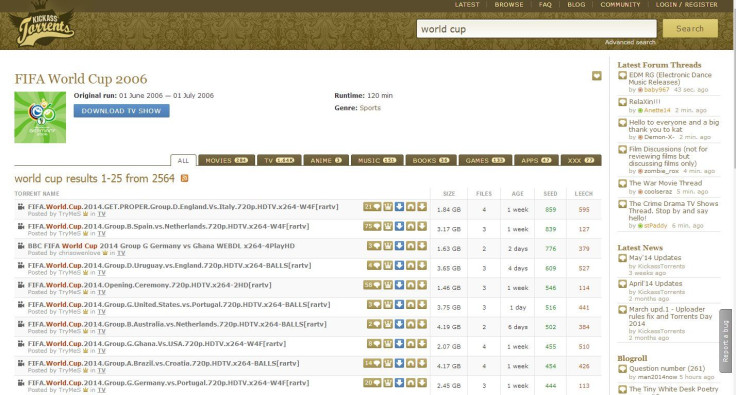World Cup 2014: Google Refuses to Remove Illegal Live Streams

TV broadcasters have long sought to curb illegal streaming of sporting events either by hunting down shadowy pirates or, more recently, putting the games online for free.
The 2014 World Cup tournament, however, has so far proven to be a headache for copyright enforcers as they compete with an increasing amount of websites that skirt trademark law.
The first volley of DMCA requests were launched, according to TorrentFreak, against 68 domains that were allegedly streaming the World Cup before the tournament actually kicked off. Google rejected a majority of the claims, allowing 46 of those sites to remain in its search results.
ESPN, owned by Walt Disney Co. (NYSE:DIS), is making the games available online to cable subscribers. Broadcast network Univision is showing the games online for free. Still, users around the world are opting for illicit streams and torrent sites.
Full copies of the games have been posted on BitTorrent sites like KickAssTor and the Pirate Bay. Often available within just a couple hours of the final whistle, thousands of downloaders have flocked to the site to save large files that will allow them to re-watch the match any time.
A single copy of the game between England and Italy featured 859 seeders (people hosting and downloading the file) and 595 leechers (users only downloading the file).
MarkScan is one of the companies working on behalf of copyright holders fearful of losing potential income to illegal sites. With a client list including HBO, BBC, Nokia and Multi-Screen Media, a Sony subsidiary based in India, MarkScan has filed hundreds of Digital Millennium Copyright Act (DMCA) requests with Google to little avail.
The situation only became more confused days later when MarkScan filed a request that included articles from various legitimate news sites that sought to explain how readers can legally watch live video from the World Cup for free.
The BBC’s “World Cup 2014: How to watch across BBC TV, radio and online” was targeted for censorship along with similar examples hosted on Variety.com, CBC.ca, the Bleacher Report and the Hollywood Reporter, among others.
While legal streams have become more ubiquitous in recent years, TV broadcasters have a big incentive to protect their investments in sports. NBC, for instance, paid $775 million for the exclusive TV and streaming rights for the Sochi Olympics, but the network admitted to the Associated Press that by the time the games were over they had shut down 45,000 illegal video feeds.
World Cup broadcasters were preparing for the same onslaught when the tournament kicked off on June 12. An online streamer who broadcast illicit feeds of the notoriously litigious Premier League told Forbes earlier this month that it wouldn’t be unusual for 150,000 to be tuning in at once, with another admitting that traffic “can be anywhere up to 500,000 viewers a week, depending on which games are on.”
Many of the most popular aggregated streams are run entirely by an individual or just a few people out of their own homes. The seemingly overwhelming task has led fans of the sites to wonder why, with so many legal alternatives, someone would dedicate so much time to providing pirated content.
“I started out doing it as a hobby, but then I lost my job,” admitted pirate HDFootball told Forbes. “I love it because I stream in good quality and I always get great comments from viewers. I worked hard to get this so good though.”
Unlike the popular stereotype of the noisy, advertisement-fueled pirated stream, though, the World Cup has been the coming out party for dozens of streams that actually add to the broadcast. TVeeder, for example, earned attention from the Hacker News community for its promise at the beginning of the tournament to air as many games as possible with subtitles, helping the hearing-impaired keep up with the latest news through the game. Other sites provided text updates or push notifications (as well as Twitter updates) for viewers away from their screen as play went on.
© Copyright IBTimes 2025. All rights reserved.





















